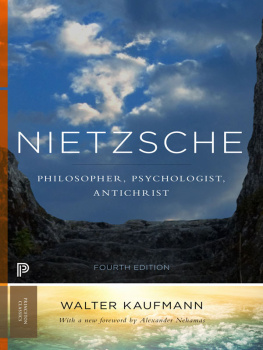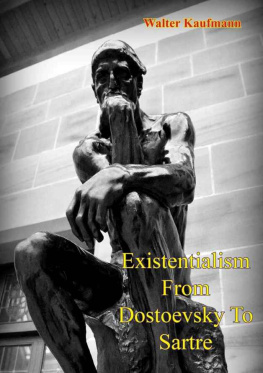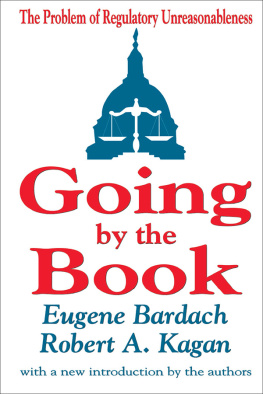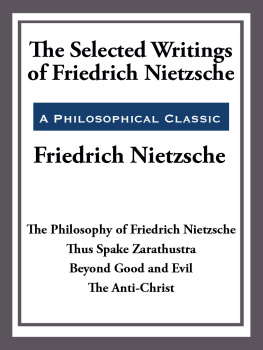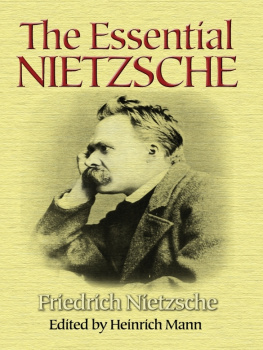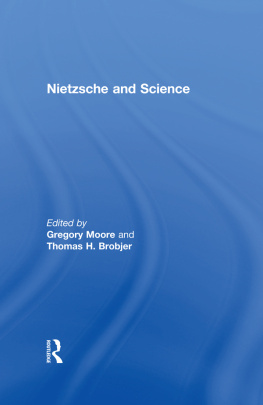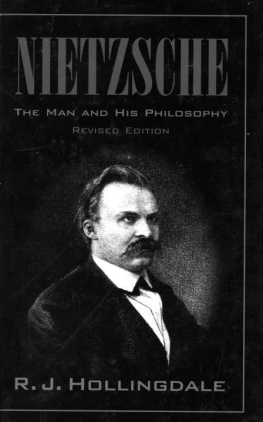
Nietzsche
Nietzsche
PHILOSOPHER, PSYCHOLOGIST, ANTICHRIST
BY WALTER KAUFMANN
With a new foreword by Alexander Nehamas

PRINCETON AND OXFORD
PRINCETON UNIVERSITY PRESS
TO MY WIFE AND CHILDREN
HAZEL, DINAH, AND DAVID
Copyright 1950, 1968, 1974 by Princeton University Press
Foreword by Alexander Nehamas copyright 2013
by Princeton University Press
Princeton University Press, 41 William Street, Princeton, New Jersey 08540
In the United Kingdom: Princeton University Press, 6 Oxford Street, Woodstock, Oxfordshire OX20 1TW
press.princeton.edu
All Rights Reserved
First printing, 1950
First paperback, 1974
First Princeton Classics edition, 2013
Library of Congress Control Number 2013944235
ISBN 978-0-691-16026-9
British Library Cataloging-in-Publication Data is available
Printed on acid-free paper.
This book has been composed in Baskerville.
The author wishes to thank the Manuscript Division of the Princeton University Library for permission to reproduce the Nietzsche letter that appears on pages 470472 and the Houghton Library at Harvard University for permission to reproduce the Nietzsche letter that appears on pages 476479. The other two letters that are reproduced are from the authors own collection.
Printed in the United States of America
10 9 8 7 6 5 4 3 2 1
FOREWORD
Enter almost any bookstore today, and you are likely to find its philosophy section crowded with Nietzsches works. That wasnt always so. It is, in large part, the accomplishment of Walter Kaufmanns Nietzsche: Philosopher, Psychologist, Antichrist, whose first edition appeared in 1950, when its author was not yet thirty, and its fourth, which is being reissued here, in 1974. Kaufmanns book brought about a radical reversal of the popular image of Nietzsche as a ranting, totalitarian anti-Semite and gradually made it possible for philosophers, who had long ago dismissed Nietzsche as a mere poet or prophet, to take him seriously once again. It marks a major turning point in Nietzsches posthumous reputation.
Friedrich Nietzsche was born in a small town in Germany in 1844. In 1869, not yet twenty-five, he was appointed a full professor of Classical Philology at the University of Baselan event unprecedented in the history of European classical scholarship and academic practice more generally. Despite his meteoric rise, though, his early works, particularly The Birth of Tragedyno less a hymn to Richard Wagners music and cultural aspirations than a controversial account of ancient Greecewere a deep disappointment to his academic colleagues. In 1879, having broken with Wagner, Nietzsche resigned his position and spent the next ten yearsill, lonely, and almost completely unknownliving nomadically, in France or Italy in winter and on the peaks of central Europe in summer. During that time, he added two parts to Human, All-Too-Human, which appeared in 1879, wrote eleven other books (including Thus Spoke Zarathustra, Beyond Good and Evil, On the Genealogy of Morality, and The Antichrist), several poems, countless letters, and thousands of pages of notes. In January 1889, he collapsed on the street while trying to shield a horse that was being flogged by its coachman. When he came to, he was no longer in control of his mind. From then on, he lived as an invalid, cared for by his mother and, eventually, his sister, Elizabeth Frster-Nietzsche, the widow of a leading German anti-Semite, who controlled his works and his reputation jealously until her death in 1935.
Nietzsche himself died in 1900, completely unaware that in the meantime he had become a major figure in European intellectual life. And not only in Europe. In the United States, too, Nietzsche was being read widely as the new century began. His
All that changed when both sides in the First World War took Nietzsches philosophy to be, in the main, an endorsement of German militarism and imperialism. Things only got worse when both Italian Fascism and German National Socialism claimed him as their own during the 1930s and the Second World War. Nietzsche was now seen as a philosopher of heartless cruelty, a thinker in harmony with Nazi ideology who, according to the Harvard historian Crane Brinton, damned democracy, pacifism, individualism, Christianity, humanitarianism [and] praised authority, racial purity, the warrior spirit and practice, the stern life and the great health.
Brintons views were somewhat qualified, but the net effect of his book, the Nazis lionization of Nietzsche, and the philosophers neglect convinced the American public that Nietzschepsychologically flawed if not totally insane, totalitarian, irrationalist, and anti-Semiticwas simply to be ignored or, if not ignored, denounced. What else, after all, could one do with ideas like the Superman, the Master Race, the Antichrist, or the Will to Powerideas that seemed to reek of racism and ruthless violence?
That was the legend, as he characterized it, that Kaufmann undertook to dismantle, tracing its creation in part to the poet Stefan George and his followers but mostly to Nietzsches sister, who picked and chose which of her brothers texts to publish, when and how, and even changed his language when it suited her purposes. Kaufmann shows that The Will to Power, which Elizabeth edited and published, is an arbitrary selection from Nietzsches notes, taken out of context and chronological order and stitched together according to her own crude understanding of her brothers thought. And yet both the Nazi Party, of which she was an avid supporter, and the philosopher Martin Heidegger, himself not an uninterested bystander, considered The Will to Power as Nietzsches own outline of a projected but unfinished magnum opus. The Nazis, in particular, claimed to find in it sanction for their ideology and their inhuman policies.
According to Kaufmann, Nietzsche acquired his reputation for heartless cruelty, anti-Semitism, and pervasive self-contradiction only because his critics felt free to quote snippets of his pithy, lively, and often exaggerated language without concern for their original context. For him, Nietzsches aphoristic style indicates a specific approach to philosophical questions: it expresses the desire to look at things from as many different points of view as possible and the willingness to experiment with ideasto test them by trying to live as they suggest. By calling his concerns existential, Kaufmann was able to connect Nietzsche to the existentialism of Kierkegaard, Heidegger, and Sartre, which was very popular during the 1950s.
Popular, yes, but not quite academically respectable. And in order to give Nietzsche an undisputed place within the philosophical canon, Kaufmann proceeds to the most controversial element in his interpretation. His Nietzsche is a rationalist heir and not, as he had been thought to be, a romantic critic of the Enlightenment. His ideal type is not Napoleon (and it certainly wouldnt have been Hitler) but Goethesomeone who conquered not the world but himself and used his power not to subjugate others but to achieve his own totality; he fought the mutual extraneousness of reason, senses, feeling, and will he disciplined himself to wholeness, he created himself. Nietzsches philosophy, as Kaufmann reads it, has its roots in Kant, Hegel, and, most surprisingly, Socrates, who became little less than an idol for him.
Although Nietzsche had charged that only scholarly oxen would ever think so, the superman, or, as Kaufmann prefers, the overman was usually interpreted as a biological category referring to a German master race whose will to power would lead it to exploit the rest of the world for its own aggrandizement. Kaufmann demolishesthere is no other word for itthat interpretation. He shows that the overman is neither a biological nor a racial concept: it indicates a type of person who overcomes not others but himself. Although he admits that Nietzsche sometimes invites misunderstanding, Kaufmann insists that overcoming involves the sublimation of our baser impulsesthe cruder forms of the will to powerinto the effort to develop foresight and to give consideration to all the impulses, to organize their chaos, to integrate them into a harmonyand thus to give man power: power over himself and over nature. What guides this effort? Nothing other than the will to power itselfbut in the guise of rationality, which is for Kaufmann its highest manifestation and gives man mastery over himself. So conceived, the overman is able to face Nietzsches notorious thought of the eternal recurrence, which Kaufmann takes, controversially, to hold that the universe repeats itself in exactly the same way over and over without end, without purpose or resting point. Only the overman, according to this interpretation, can bear the thought that the world has no inherent purpose and life no intrinsic meaning, for the overman
Next page
